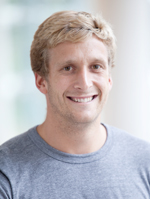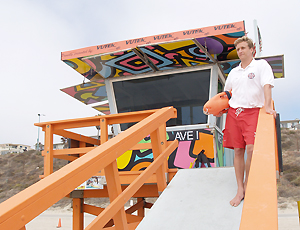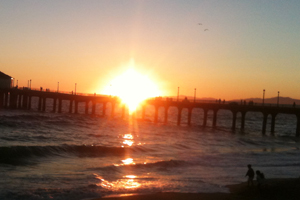

Saving Lives, Giving Back
For This Life Saver, the Important Part is Giving
Although he's not a doctor yet, Andrew Herzik already knows what it's like to save a life. The first-year medical student formerly rescued swimmers as a lifeguard on the beaches of southern California. And now he makes his home in the Bronx, learning medicine at Einstein, hoping one day to save lives in the ER.

Andrew Herzik"My main impetus for becoming a doctor is a desire to give back to society in some way," he explained. He remembers the moment this fleeting idea became an achievable goal.
It was a sunny Saturday in May 2009. From his lifeguard tower on Redondo Beach, Mr. Herzik noticed that a young boy was caught in a dangerous rip current that was pulling him underwater along with the heroic dad who sought to protect him.
Having been an ocean lifeguard with the L.A. County Fire Department for six years, he reacted instantly, sprinting while gauging the angle of the rip current in order to reach the two victims in time. He pulled the 11-year-old up from underwater by his hair, and was able to get both father and son safely to shore, into the arms of a crying mother.
"They would have drowned within 30 seconds if I hadn't reached them," he said. "It was pretty scary."
The save was particularly memorable because of the circumstances around it. "It was the day before Mother's Day," said Mr. Herzik. "I started crying too, realizing I'd been able to make sure this woman had a Mother’s Day."
That moment changed him. He wanted to make saving lives part of his everyday life, not just a summer vocation. Thinking back, making a difference always seemed like the right thing to do.
"It was an idea passed on to me by my parents," he said. "My mom and dad worked really hard so my brother and I could do whatever we wanted with our lives. But it was always understood that we do something good for others."
With his mom working as a nurse practitioner and his dad risking his life daily as a commercial sea urchin diver, combining the two and becoming a lifeguard seemed like a fated goal.

Andrew Herzik at his "office tower" on Redondo Beach "I spent a lot of time on the beach," said the Los Angeles native. "I grew up surfing and developed a respect for the lifeguards. What they do is pretty impressive."
While preparing for college, Mr. Herzik went through the rigorous training to become a lifeguard. "Being a lifeguard showed me that the power to help people was tied to the knowledge you possessed."
While lifeguarding, Mr. Herzik also became an emergency medical technician (EMT), striving to make a difference in other people’s lives whenever he could. Ironically, his most courageous moment occurred when he was off-duty – earning him a prestigious medal of valor.
"I was on a date with my girlfriend at Tony's on the Pier, in Redondo Beach, when I noticed a disabled sailboat with two adults and a child aboard," he explained. The boat's engine had failed and, as choppy waters carried it toward the narrow pilings, Mr. Herzik ran to the end of the pier and jumped 25-feet to the water below. Reaching the boat, he placed life vests on the passengers and ushered them into safer waters to await the harbor patrol. When the rescue was complete, he swam back to shore and rejoined his girlfriend.
"It didn't seem like a big deal," he said. "Every lifeguard I know would've done the same. If you know how to help someone, you just do it."
Learning to become a doctor seemed like the next step, but Mr. Herzik didn't feel mature enough for medical school. He had taken pre-med courses, but still didn't feel ready.
A trip to India brought him closer to his fated path. Without the help of any program backing, Mr. Herzik spent a month shadowing two doctors at a neurology clinic in the town of Patna. While observing how doctors could relieve the pain of people who only had their health to hold onto, the idea of becoming a doctor truly began to take hold. The pre -Mother's Day rescue further solidified his decision.

The end of a work day With becoming a doctor his priority, he first worked as a research assistant in the emergency department of Cedar-Sinai Hospital. Then, while achieving a flawless post-baccalaureate academic record at American University, he also responded to emergency calls in an ambulance in Washington, D.C.
"I applied to a ton of medical schools, but Einstein felt like the right match for me," he said. "It seems to celebrate the uniqueness of each applicant. There is a real diversity of life experiences here, and everyone is so incredibly smart."
While his classmates have pushed him to excel academically, it's the action that excites Mr. Herzik, who thus far considers his most memorable moment at Einstein learning how to draw blood with the Emergency Medicine Club. His current aspiration is to become an ER doctor.
"I like the fast pace. It's a natural extension of my lifeguarding career," he said. "As an EMT, my main goal was to stabilize the patient until I could get them into the hands of the professionals. As a doctor, I'll be the one waiting on the other end of the ambulance ride – ready to actually fix the problem."
Posted on: Thursday, November 3, 2011

Tablet Blog